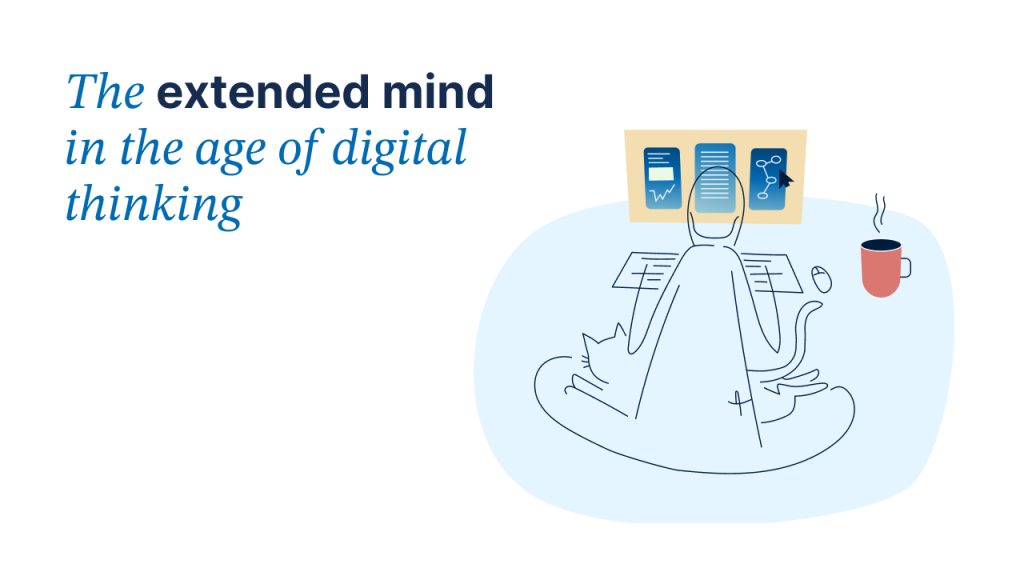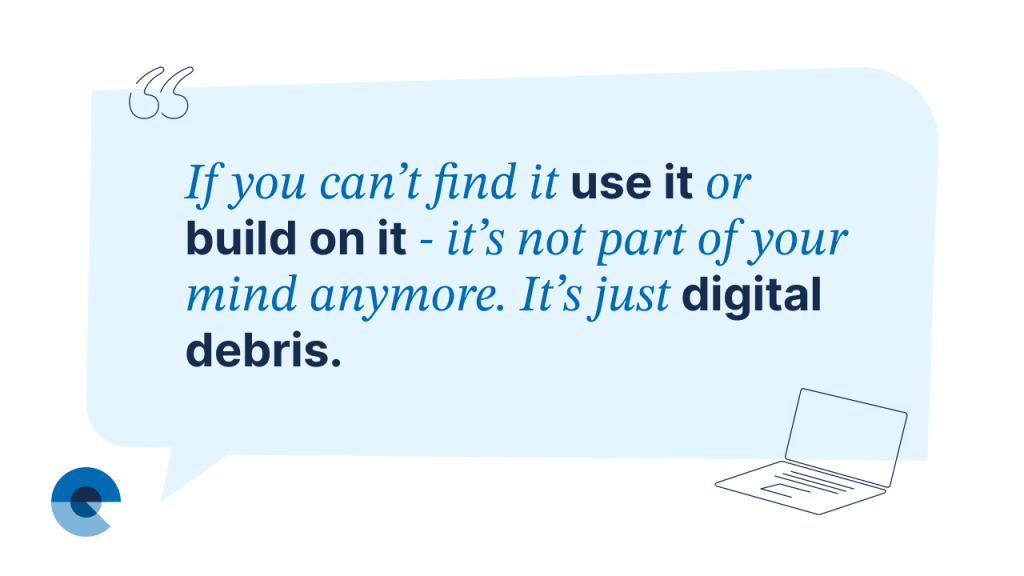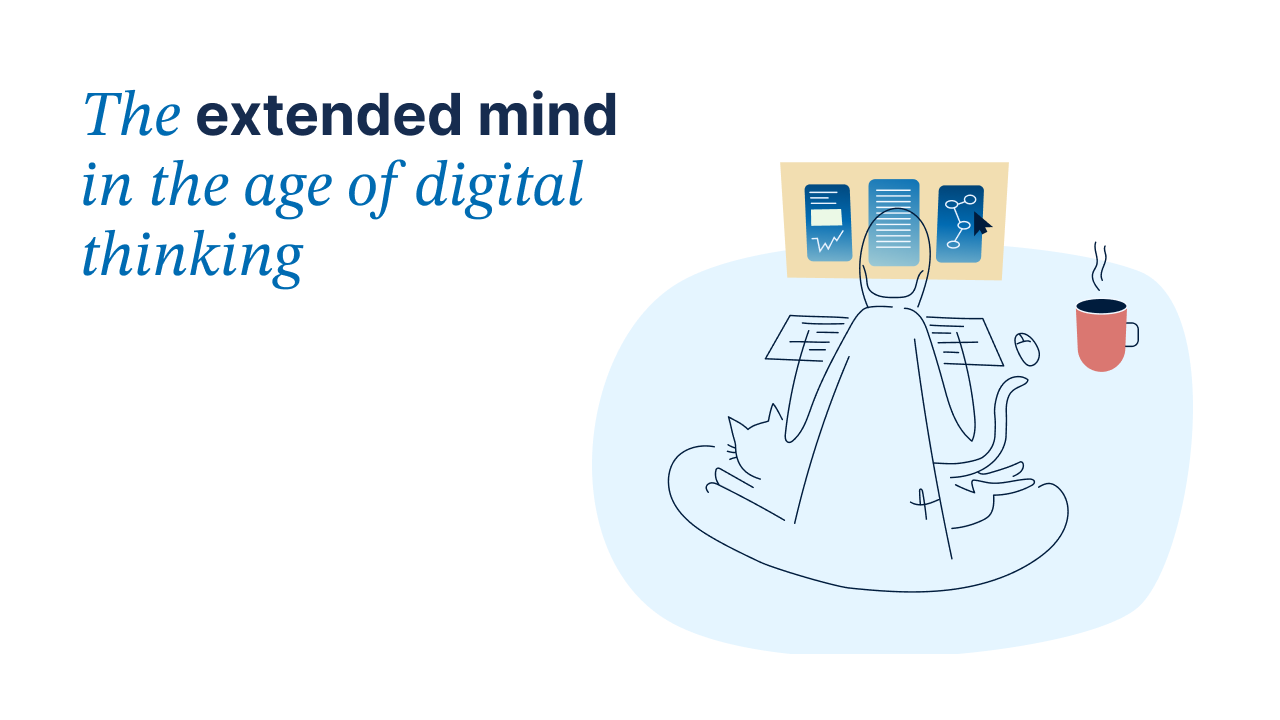Your Mind Doesn’t End at Your Brain
Imagine you’re working on a complex idea. You reach for your notebook to sketch a diagram, look up an article you saved last month, or glance at a note on your monitor. What if all of that—your tools, notes, files—aren’t just supporting your thinking, but are actually part of your thinking?
The Extended Mind Concept proposes that our cognitive processes aren’t confined to our brains but can extend to include external tools and the environment when they function as an integral part of our thinking. Developed by philosophers Andy Clark and David Chalmers in 1998, they argued that when external tools reliably help us process and store information—like our notebook, our digital files, and now our AI agent—they become part of our personal cognitive system. Not just aids to memory, but extensions of our mind itself.

Thinking Outside the Brain: How Your Tools and Files Become Mind
We often imagine thinking as something that happens entirely inside our heads. But in real life, we constantly “offload” parts of thinking to the outside world. We write things down not just to record them, but to understand them more clearly. We draw diagrams or arrange ideas on paper to grasp complex relationships that are hard to picture in our minds alone. And we return to notes or saved documents, because we intentionally stored them as extensions of our memory.
Clark and Chalmers argued that when we use tools in a reliable, integrated and connected way, they’re not external to thought—they are thought. They called this the parity principle: if an external tool does what your brain would do internally, it deserves the same cognitive status.
It’s a liberating idea. It tells us that intelligence isn’t a solo act inside your brain—it’s a networked process that includes our environment, technology, and tools.
Today’s Problem: We’re Saving, But Not Thinking
Today, we have more tools and files than ever. Apps. PDFs. Files. Websites. And countless digital folders. But something’s broken:
We look up everything—and forget everything.
Why? Because looking up isn’t thinking. And just saving a file isn’t thinking either. A thought only remains part of your extended mind if it stays connected to your ongoing thinking and your knowledge. If you can’t find it, use it, or build on it—it’s not part of your mind anymore. It’s just digital debris.
This is a critical part of understanding “the extended mind”. An extended mind has organized and connected information. You build it over time, by reorganizing source material, developing and connecting topics, and weaving new information into what you already know.
From Philosophical Concept to Productivity Powerhouse
The extended mind isn’t just a fascinating philosophical concept; it’s a practical framework for boosting productivity and accelerating self-improvement. By consciously building and curating our extended minds, we can offload the burden of remembering every detail, freeing up our brains for higher-level thinking, creativity, and problem-solving.
With the right software tool and concept, you can create a digital extension of your mind – a personal system for capturing, organizing, and retrieving knowledge, where your ideas, notes, and research are stored and meaningfully connected.

Such a system offers numerous benefits. It becomes a reliable and searchable memory, allowing you to access what you know without needing to collect everything from scratch. By externalizing thoughts, it supports creativity—helping you view ideas from new angles, notice unexpected patterns, and spark fresh insights. Offloading information reduces mental clutter, which in turn lowers stress and sharpens focus. And when your knowledge is structured and layered, it actively supports deeper, faster learning by building on what you already know.
You need to give your extended mind a digital home
The truth is: there is no shortcut to knowledge—only learning. Looking things up or dumping files onto a disorganized hard drive, without structure or a dedicated tool, will leave you behind.
Knowledge requires time, engagement, and emotion. But remember: you inevitably forget. That’s why you should invest in building your extended mind—step by step, puzzle piece by puzzle piece. And now, your extended mind can make a great leap with AI, into the coming age of digital thinking.
Elumity was built for this moment.
Meet Elumity – build your extended mind
Replace multiple tools with one intuitive platform and transform the way you build and grow your knowledge. Elumity is a personal system designed to collect, organize, connect, and advance knowledge, serving as the ultimate tool for creating an extended mind. It was developed for more than 200 million academics, including students, researchers, physicians, and other professionals in the medical, natural, and social sciences.
- Capture information sources – articles, images, videos, files – into the library of your personal extended mind. Organized. Clean.
- Process your sources and summarize knowledge using Elumity’s topic cards. Create them manually or let Elumity’s AI do it. Summaries, information in context, with backlinks—and update suggestions when the time is right (your AI agent will let you know). Link new information to what you already know, and create a rich web of knowledge that sparks new ideas and insights. This is where your extended mind truly comes to life.
- Because it’s an all-in-one suite for academics, you can craft your thesis or paper with your cards side-by-side with the text you write – with your AI agent always ready to help. And the simplest reference management you’ve ever used.
- Ever wondered where to keep your valuable AI chats? Your AI agent lives inside your extended mind, within Elumity, rather than disconnected from your documents and thoughts. Think across time, documents, and ideas—not just within them.
- Elumity identifies your knowledge gaps and pairs you with an AI tutor that guides your learning systematically—one step at a time, always connected to your existing insights. Customize the level of detail, the mode (scaffolding, debate, reasoning), and the time you invest.
- You stay connected with your peers. Post cards, collaborate in groups, and benefit from others. Your knowledge is shared with your academic community – not lost in the lonely no-man’s-land of EndNote, Evernote, or other generic tools never built for this purpose.
Your brain deserves an extension. But more than that—it deserves integration of external knowledge. Elumity makes your knowledge not just stored, but alive. Not just remembered, but part of your thinking self.
Final Thought: Your Mind Isn’t Limited to Your Brain—Unless You Let It Be
The way we work and learn is changing. In a world overwhelmed by information, the ability to manage knowledge effectively is becoming a defining skill. The concept of the extended mind offers a powerful lens for rethinking how we learn, create, and make decisions—by showing that our tools and environment can become part of our cognitive process. With the right systems in place, we can lighten the mental load, think more clearly, and act more wisely.
That’s where Elumity comes in. It’s a dedicated platform for building your extended digital mind—a place to capture, connect, and transform knowledge into insight, and insight into lasting understanding. With the right tools, your mind doesn’t stop at the edge of your brain.
Are you ready to build your extended mind? Try Elumity today and unlock your full intellectual potential.
